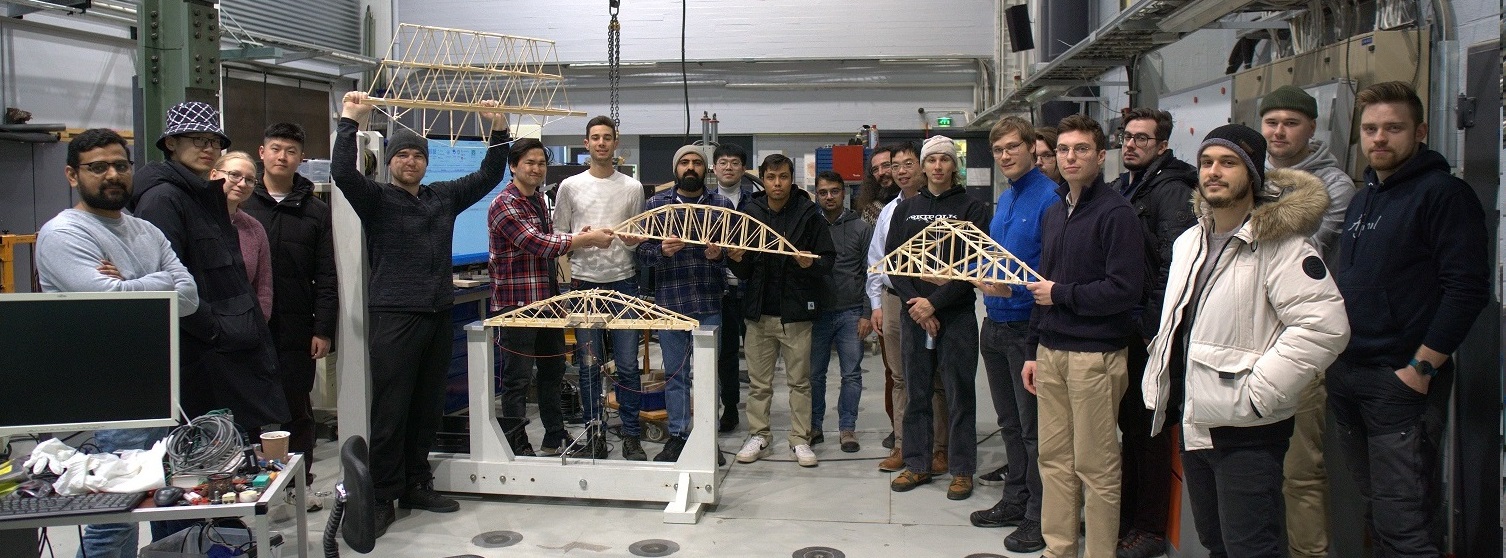
LEARNING OUTCOMES
This course aims to help the student develop an intuitive feeling about the structural features of different types of bridges, and enable students to have the basic concepts in proportioning and design of bridges in terms of aesthetics, geographical location and functionality. In addition, this course also aims to describe the research focuses in current engineering practice, such as bridge inspection, monitoring systems as well as the repair and strengthening methods for existing bridges. Evaluate and apply methods to do conceptual (master) level design of a large bridge for aesthetically and functionally demanding city environment.
With passing the course student recognize the fundamental and some special issues in bridge design, and can successfully deepen his/her studies by professional training, special assignment, or master's thesis related to bridge engineering.
Credits: 5
Schedule: 22.10.2024 - 05.12.2024
Teacher in charge (valid for whole curriculum period):
Teacher in charge (applies in this implementation): Weiwei Lin
Contact information for the course (applies in this implementation):
CEFR level (valid for whole curriculum period):
Language of instruction and studies (applies in this implementation):
Teaching language: English. Languages of study attainment: English
CONTENT, ASSESSMENT AND WORKLOAD
Content
valid for whole curriculum period:
Introduction of bridge engineering, classification of bridges, bridges design & planning, loads and load distribution, construction materials, general of concrete bridges, reinforced concrete bridges, prestressed concrete bridges, general of steel bridges, truss bridges, cable stayed bridges, suspension bridges, and bridge bearing.
applies in this implementation
· Activating teaching lectures related to design of bridge, such as (1) classification of bridges, (2) bridges design & planning, (3) loads and load distribution (including influence line), (4) Bridge deck system, (5) concrete bridges, including reinforced concrete bridges and prestressed concrete bridges, (6) truss bridges, (7) cable stayed bridges, (8) suspension bridges, (9) bridge construction methods, and (10) bridge bearings.
· In the exercise sessions, influence line analysis and bridge design exercises will be conducted. In addition, two student seminars, including (1) Student seminar I- Eurocodes for bridge design, and (2) Student seminar II – bridge model design and loading tests, will be organized.
· Furthermore, one visit to the construction site of Crown Bridges in Helsinki will be organised.
Assessment Methods and Criteria
valid for whole curriculum period:
Assessment will be conducted considering assignments, the student seminars on Eurocodes, the group project (bridge model design and loading test), and the final exam.
applies in this implementation
· Homework (Influence line): 10%
· Student seminar I (Eurocodes for bridge design): 10%
· Group project:Bridge model design, presentation, and loading test: 20%
· Final exam: 60%
Workload
valid for whole curriculum period:
Lectures, exercises, group projects, and student self-learning. Details will be given in the syllabus
applies in this implementation
· Lectures: 24 hours (2×2 hours/week, 6 weeks).
· Exercise and exercise consultancy: 24 hours (2×2 hours/week, 6 weeks), including 2h for sit visit to Crown Bridges.
· Homework and group project work: 60h
· Student self-learning: 24h
· Examination: 3h
Total: 135 hours.
DETAILS
Study Material
valid for whole curriculum period:
Textbook (e-book is available at aalto university): Bridge Engineering (1st Edition) / W. LIN, and T. YODA / Butterworth-Heinemann, 2017
https://www.elsevier.com/books/bridge-engineering/weiwei/978-0-12-804432-2Handout will be available in MyCourses.
applies in this implementation
· Textbook (the e-book is available at Aalto university): Bridge Engineering (1st Edition) / W. LIN, and T. YODA / Butterworth-Heinemann, 2017.
· Handouts (lecture and exercise, and project work instructions etc.) will be available in MyCourses.
· Other literature will be presented during lecture and exercise sessions.
Substitutes for Courses
valid for whole curriculum period:
Prerequisites
valid for whole curriculum period:
SDG: Sustainable Development Goals
9 Industry, Innovation and Infrastructure
11 Sustainable Cities and Communities
13 Climate Action
FURTHER INFORMATION
Further Information
valid for whole curriculum period:
Teaching Language: English
Teaching Period: 2024-2025 Autumn II
2025-2026 Autumn IIRegistration:
Registration for the course will take place on Sisu (sisu.aalto.fi).
